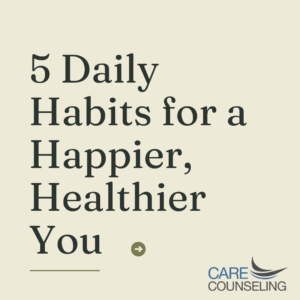5 Daily Habits for a Happier, Healthier You
 Do you want to boost your happiness and well-being? The secret may lie in your daily habits. Small, consistent actions can have a significant impact on your overall happiness and health. In this blog post, we’ll explore five daily habits that can help you become a happier and healthier version of yourself.
Do you want to boost your happiness and well-being? The secret may lie in your daily habits. Small, consistent actions can have a significant impact on your overall happiness and health. In this blog post, we’ll explore five daily habits that can help you become a happier and healthier version of yourself.
- Start Your Day with Gratitude
Gratitude is a powerful emotion that can transform your perspective and boost your happiness. Each morning, take a moment to reflect on the things you’re grateful for. It could be as simple as the sunshine streaming through your window or the smell of freshly brewed coffee. By acknowledging the positive aspects of your life, you set a positive tone for the day.
Practicing gratitude can also improve your mental and emotional well-being. Research has shown that regularly expressing gratitude can reduce stress, increase optimism, and enhance your overall satisfaction with life. Consider keeping a gratitude journal to jot down the things you’re thankful for each day. Over time, you’ll develop a more positive mindset and a greater sense of contentment.
- Stay Active
Regular physical activity is not only good for your physical health but also for your mental well-being. Incorporating exercise into your daily routine can lead to a happier and healthier you. Physical activity releases endorphins, which are often referred to as “feel-good” hormones. These endorphins can reduce stress, alleviate symptoms of depression, and boost your mood.
You don’t need to become a gym rat to reap the benefits of exercise. Even a short daily walk, a quick home workout, or practicing yoga can make a difference. Find an activity you enjoy, and it will be easier to stick with it. As you become more active, you’ll notice improved energy levels, better sleep, and a greater sense of well-being.
- Practice Mindfulness and Meditation
In our fast-paced world, it’s easy to get caught up in the chaos of daily life, leading to stress and anxiety. Mindfulness and meditation are valuable tools to help you stay present, reduce stress, and enhance your mental clarity. Taking a few minutes each day to meditate or practice mindfulness can have a profound impact on your well-being.
Meditation allows you to quiet your mind and find inner peace. It helps you become more aware of your thoughts and emotions, allowing you to better manage them. Mindfulness, on the other hand, involves being fully present in the moment and accepting it without judgment. Both practices can help you reduce stress, improve focus, and increase self-awareness.
- Maintain a Balanced Diet
What you eat has a direct impact on your physical and mental health. Consuming a balanced diet that includes a variety of nutrient-rich foods can lead to improved energy levels, better mood, and overall health. Ensure your daily meals include a mix of fruits, vegetables, whole grains, lean proteins, and healthy fats.
Avoid excessive consumption of processed foods, sugary snacks, and excessive caffeine. These items can lead to energy crashes and mood swings. Instead, focus on foods that provide sustained energy and essential nutrients. A healthy diet can improve your physical health, boost your cognitive function, and contribute to a happier, healthier you.
- Connect with Others
Human beings are social creatures, and maintaining positive social connections is crucial for our happiness and well-being. Try to connect with others daily, whether it’s with family, friends, or even strangers. Engaging in meaningful conversations, spending quality time with loved ones, and showing kindness to others can all contribute to your happiness.
Having a support network can be a source of emotional strength during challenging times. It can also provide a sense of belonging and purpose. If you’re feeling down, talking to someone you trust can be a great way to gain perspective and receive emotional support.
In conclusion, these five daily habits—gratitude, physical activity, mindfulness and meditation, a balanced diet, and social connections—can significantly improve your happiness and overall well-being. By incorporating these habits into your daily routine, you’ll be on your way to becoming a happier, healthier version of yourself. Remember that lasting change takes time, so be patient with yourself as you work to make these habits a part of your daily life.



























